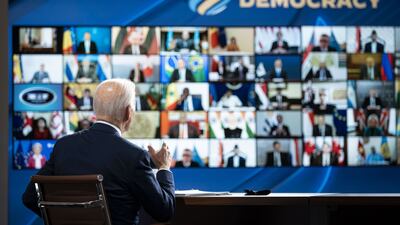US President Joe Biden has warned of a “backward slide” in democracies around the world and urged nations to act together to counter it.
Speaking on Tuesday at the launch of his much-touted virtual “Summit for Democracy”, attended by leaders and representatives of more than 100 countries and territories, Mr Biden said democracy faces “sustained and alarming challenges” worldwide and said trends are “largely pointing in the wrong direction".
“We stand at an inflection point,” Mr Biden said. “Will we allow the backward slide of rights and democracy to continue unchecked?”
The two-day event, held by video link due to the pandemic, was billed by the White House as US leadership in an existential struggle between democracy and autocracy.
It comes as the US faces a crucial struggle to protect its own democracy following the deadly January 6 riots in which a mob of pro-Donald Trump loyalists attempted to overturn Mr Biden's 2020 electoral win.
Fuelled by Mr Trump's debunked claims of election fraud, the Republican Party is working to pass a series of “voter integrity” laws at the state level that it says will root out voter irregularities.
But critics say the laws are a blatant drive a to disenfranchise city dwellers and people of colour, who tend to lean Democratic.
Mr Biden's summit has also drawn controversy over who was invited and who was snubbed.
China and Russia were pointedly left out, something they say is stoking an ideological rift.
“No country has the right to judge the world's vast and varied political landscape by a single yardstick,” ambassadors to the US Anatoly Antonov of Russia and Qin Gang of China wrote in a joint essay last month.
Without mentioning either country out by name, Mr Biden said autocratic nations “export and expand their influence around the world and justify the repressive policies and practices as a more efficient way to address today's challenges".
Deciding which other countries should be excluded was also fraught, with Pakistan and the Philippines invited, but not EU member Hungary. Brazil's right-wing President Jair Bolsonaro was invited, while the leader of Nato member Turkey, Recep Tayyip Erdogan, was shunned.
While the summit carries awkward elements for Mr Biden as he struggles to restore faith in democracy at home, some analysts nonetheless saw it as an important event for the US to host.
"We’re in a good position to lead a summit on democracy because we have the experience of ebbs and flows," said Kermit Roosevelt, a law professor at the University of Pennsylvania Law School.
"We’re not in a good position to hold ourselves out as a model, but we can certainly talk about the challenges that democracy faces," he countered.
Mr Roosevelt added that he had "serious fears" about the future of US democracy, primarily because of how the Constitution gives outsized representation to some parts of the country, allowing for minority rule.
"Once in power, the minority can seek to entrench itself by further distorting democracy, through voter suppression, gerrymanders, and some of the more extreme ideas we’ve seen floated recently about rejecting electoral outcomes that people in power don’t like," he told The National.
Bruce Jentleson, who teaches political science at Duke University, said the summit was “never a good idea".
“Our problems here are much worse than in any other western democracy. We had our Capitol building attacked, an attempted coup. We haven't seen that happen in Paris, or at the Bundestag, or at the EU headquarters in Brussels,” he told AFP.
“If we want to compete, we've got to do our best and that is really more up to us within the country than somehow getting 100 leaders together and saying, 'We like democracy.'"
The Republican Governor of Vermont, Phil Scott, said Mr Trump's attempts to overturn the 2020 election were a "very low moment" in US history.
"This is a powerful reminder of why we must always guard against authoritarianism and the manipulation of would be dictators from both the right and the left," he told the summit.
British Prime Minister Boris Johnson meanwhile said the world "cannot take democracy for granted."
"Nor should we waver in our faith that trusting the people is the surest route to national unity and success,” he said, according to prepared remarks.
Mr Johnson pledged more openness to the purchase of properties in the UK by overseas entities and said London would put forward new laws to “safeguard our democratic processes and institutions from those who would do us harm".
AFP contributed to this report
































